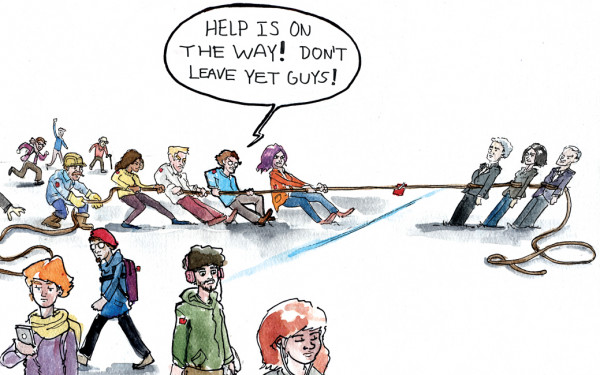Uniting Against Tuition Increase
Concordia Students Host Panel Discussion
Quebec students will not take the newest provincial budget cuts to education and social services without a fight.
On Oct. 13, the Concordia Student Union hosted a panel discussion on alternative ways to keep education costs accessible in Quebec. Members of the Fédération étudiante universitaire du Québec, l’Association pour une solidarité syndicale étudiante, the Quebec Students’ Roundtable and Free Education Montreal discussed the dangers of an end to the tuition freeze in 2012.
Together, the four organizations represent the interests of over 200,000 post-secondary students in Quebec, a population roughly the size of Longueuil.
“Most countries know that education is the basis of their social contract, of their society,” said Robert Sonin from FEM, an organization started at Concordia last year uniting students and community members in the educational debate. “The more education you have, the better your country, the lower your crime rates, the higher your incomes.”
“There is currently no vision in the government and the civil society as a whole of what we have to do with universities,” said Louis-Philip Savoie, president of FEUQ. “We are living in a very rich country. And we have the money to fund what we want to fund.”
Martin Robert, representing l’ASSÉ, agreed.
“Studies done in 2007 found that if education were to be free for everyone at all levels, the cost represented less than five per cent of Quebec’s budget,” said Robert.
All parties proposed a system of progressive taxation on the private education system as part of the solution, rather than higher individual contributions from students.
Fighting tax evasion is another way to get money from the private sector, suggested Joël Pedneault from TaCEQ.
“The associations present here sometimes have different philosophies and ways of functioning,” said Pedneault, “and I don’t think that’s a bad thing. But we do need to set our differences aside and coordinate our efforts.”
“Our only weapon is the strength of numbers,” said Robert.
Yet there is a feeling of apathy lingering around the “freeze tuition costs” message. Concordia’s panel session to encourage participation in the student movement gathered a meagre 50 students.
A common criticism of the campaign to keep tuition frozen is that Quebec already has the lowest fees in Canada. Incidentally, it also has the highest registration rates.
“Yes, we are privileged for sure,” said Erik Chevrier, mediator of the panel and member of FEM. “But that doesn’t mean we should do nothing about the proposed increases. Privilege has come because we have actually stood up for our rights in Quebec. So if you want to continue to enjoy that privilege, I encourage you to do the same and to fight to keep accessible education and social services!”
This article originally appeared in Volume 31, Issue 10, published October 19, 2010.

__900_598_90.jpg)


__600_375_90_s_c1.jpg)
2_1_600_375_90_s_c1.jpg)